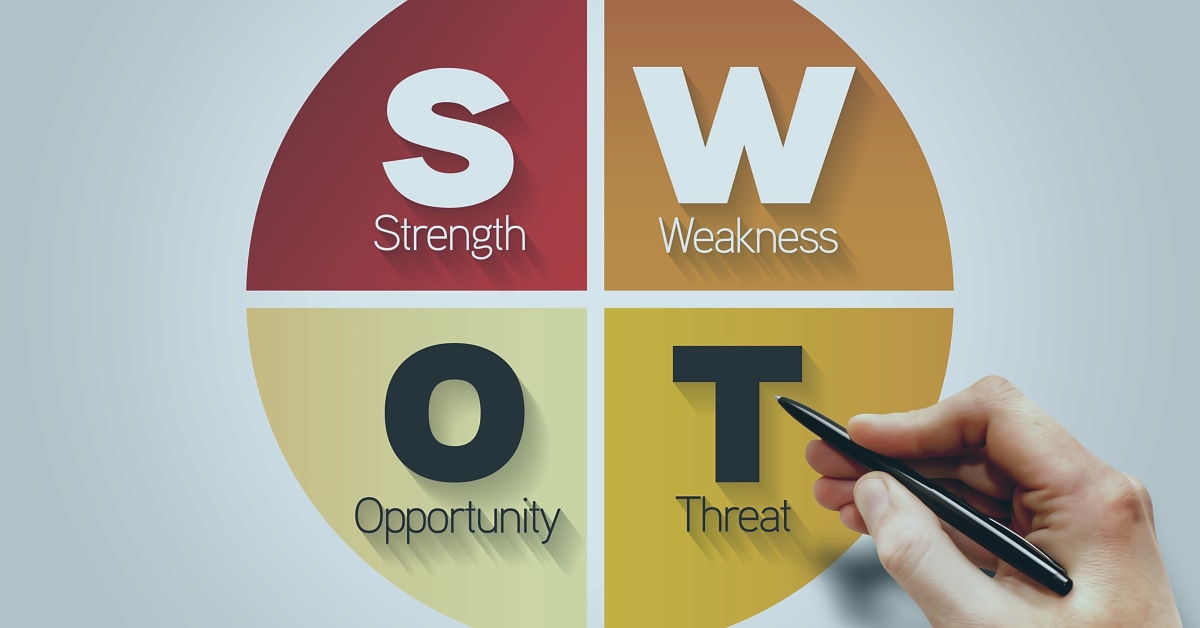Identifying strengths and weaknesses in strategic planning and consulting
 by Consultant
by Consultant

Welcome to our article on identifying strengths and weaknesses in strategic planning and consulting. In today’s fast-paced business world, it is crucial for companies to have a strong understanding of their strengths and weaknesses in order to stay competitive and achieve success. Strategic planning and consulting play a vital role in this process, helping businesses analyze their current state and make informed decisions for the future. In this article, we will delve into the key concepts of identifying strengths and weaknesses, and how it ties in with strategic planning and consulting. Whether you are a business owner, manager, or consultant, this article will provide valuable insights and strategies to help you improve your organization’s performance. So let’s dive in and discover how to effectively identify and leverage your strengths while addressing your weaknesses for a successful business strategy.
To begin with, it’s important to understand what we mean by ‘strengths’ and ‘weaknesses’ in the context of strategic planning. Strengths refer to the positive attributes or advantages that a company possesses, such as a strong brand reputation or a highly skilled workforce. On the other hand, weaknesses are areas that need improvement, such as outdated technology or a lack of diversity in the workforce. Identifying these factors is crucial in developing a successful strategy for your business.
One of the main reasons people search for information on strategy consulting is because they are looking for ways to improve their business strategy. Therefore, it’s important to cover topics such as strategic planning techniques, effective decision making, and setting achievable goals. These are all key elements in developing a strong and successful strategy for your business. Additionally, providing real-life examples of companies that have implemented effective strategies can help readers better understand the concepts.
Another aspect that people may be interested in when it comes to strategic planning is the role of leadership. Effective leadership is vital in driving a successful strategy and achieving goals. Therefore, it’s important to cover topics such as leadership styles, communication techniques, and creating a positive company culture. These are all essential elements in developing a strong and effective strategy for your business.
In addition to strategic planning, readers may also be interested in learning about resources for strategic analysis and thinking. This can include tools and techniques for analyzing market trends, competitor analysis, and identifying potential opportunities for growth. It’s important to provide a variety of resources and examples to cater to different learning styles and preferences.
Finally, it’s important to touch on the role of management consultants in strategic planning. Many individuals may be seeking guidance from these professionals in developing and implementing their business strategy. Therefore, it’s valuable to cover topics such as the role of management consultants, how to choose the right consultant for your business, and the benefits of working with one.
Overall, it’s crucial to emphasize the importance of identifying strengths and weaknesses in strategic planning and consulting. By doing so, businesses can develop a more effective and successful strategy that will ultimately lead to growth and success. Anyone who disagrees with this point would likely argue that strategy is not the only factor in a business’s success, but it is certainly a major contributor.
The role of management consultants
In the fast-paced and competitive world of business, having a strong and effective strategy is essential for success. However, developing an effective strategy can be a daunting task, especially for those without prior experience or expertise in strategic planning. This is where management consultants play a crucial role.
Management consultants are professionals who specialize in providing guidance and advice to businesses on how to improve their overall strategy and operations. They have extensive knowledge and experience in various industries and can offer valuable insights and perspectives that business owners may not have considered.
When it comes to identifying strengths and weaknesses in strategic planning, management consultants are an invaluable resource. They can conduct thorough analyses and evaluations of a company’s current strategy, processes, and operations to identify areas of improvement. With their expertise, they can provide tailored recommendations and solutions that can help businesses maximize their strengths and address their weaknesses.
Furthermore, management consultants can also assist in developing a comprehensive SWOT (strengths, weaknesses, opportunities, threats) analysis. This analysis is crucial in identifying internal and external factors that can affect a company’s success. By identifying these factors, businesses can make informed decisions and adjustments to their strategy to stay ahead of the competition.
Overall, the role of management consultants in identifying strengths and weaknesses in strategic planning and consulting cannot be underestimated. Their guidance and expertise can help businesses create a strong and effective strategy that will drive success and growth. So if you’re looking to improve your business strategy, consider seeking guidance from a reputable management consultant.
Resources for strategic analysis and thinking
In order to identify strengths and weaknesses in strategic planning and consulting, businesses must utilize various resources for strategic analysis and thinking. These tools and techniques allow companies to analyze market trends and identify potential opportunities for growth and improvement.
One of the most commonly used resources for strategic analysis is SWOT analysis, which stands for strengths, weaknesses, opportunities, and threats. This tool allows businesses to assess their internal strengths and weaknesses, as well as external opportunities and threats in the market. By identifying these factors, businesses can develop strategies that capitalize on their strengths and minimize their weaknesses while taking advantage of opportunities and mitigating potential threats.
Another resource for strategic thinking is market research. This involves gathering data on consumer behavior, market trends, and competitor analysis to gain a better understanding of the market landscape. By conducting thorough market research, businesses can identify potential opportunities for growth and make informed decisions about their strategy.
Other tools and techniques for strategic analysis include PEST analysis (political, economic, social, technological), Porter’s Five Forces (bargaining power of suppliers, bargaining power of buyers, threat of new entrants, threat of substitutes, competitive rivalry), and scenario planning. These methods provide businesses with a comprehensive understanding of their industry and help them make informed decisions about their strategy.
The role of strengths and weaknesses in strategic planning
When it comes to running a successful business, having a strong and effective strategy is crucial. However, it’s not always easy to know where to start or what areas to focus on. This is where strategic planning and consulting come in. One of the key elements in this process is identifying the strengths and weaknesses of your business.
Understanding the importance of identifying strengths and weaknesses
To create a successful business strategy, it’s important to have a clear understanding of your company’s strengths and weaknesses. This allows you to capitalize on your strengths and address any weaknesses that may hinder your progress. By identifying these factors, you can make informed decisions about where to focus your efforts and resources.
Furthermore, identifying your strengths and weaknesses can also help you better understand your competition. By knowing where your business excels and where it may fall short, you can compare yourself to other companies in your industry and determine how to differentiate yourself.
The role of strengths and weaknesses in strategic planning
When it comes to strategic planning, your strengths and weaknesses play a crucial role in shaping your overall strategy. Your strengths can be leveraged to create unique selling points and competitive advantages, while your weaknesses can be addressed to prevent them from becoming obstacles.
In addition, by identifying your strengths and weaknesses, you can also identify potential opportunities and threats. For example, if one of your strengths is a strong online presence, you may be able to capitalize on the growing trend of e-commerce. On the other hand, if one of your weaknesses is a lack of diversity in products or services, you may need to consider expanding your offerings to stay competitive.
In conclusion
Identifying strengths and weaknesses in strategic planning and consulting is essential for creating a successful business strategy. By understanding these factors, you can make informed decisions, capitalize on your strengths, and address any weaknesses that may hinder your progress. So take the time to thoroughly evaluate your business, and use this knowledge to drive your strategic planning process.
In conclusion, identifying strengths and weaknesses is a crucial aspect of strategic planning and consulting. By understanding where your company excels and where it needs improvement, you can develop a stronger and more effective strategy that will lead to growth and success. Don’t overlook the importance of this step in your business journey.
Related Posts
Learn about the importance of identifying strengths and weaknesses in strategic planning and consulting, and how it can benefit your business.
Business Consulting Articles
- About cookies and cookie consent
- Advisory Consulting
- Business Growth Consulting | Unlocking Your Business Potential
- Business Process Consulting Services Can Improve Your Business
- Organizational Development Consultant
- Privacy Policy
- Strategic Advisory Services Explained: A Comprehensive Guide
- Top 100 Advisory Consulting Terminology
- Top 100 AI as a Service (AIaaS) Terminology
- Top 100 Business Consulting Terminology
- Top 100 Executive Coaching Terminology
- Top 100 Operation Management Terminology
- Top Advisory Consulting Terminology
- Top AI as a Service (AIaaS) Terminology
- Top Business Consulting Terminology
- Top Executive Coaching Terminology
- Top Operation Management Terminology
- AI Generated Q&As
- Benefits of advisory consulting
- Blog
- Boutique Firms
- Budgeting
- Business advisory consulting
- Business Consulting
- Business consulting services
- Business Management
- Business planning
- Case studies on specific industries
- CEO
- CFO
- Change management
- CIO
- Client success stories
- CMO
- Collaboration and partnerships
- Consulting
- COO
- Creative thinking
- Critical thinking skills
- Culture and values
- Executive Coaching
- Expert guidance and insights
- Financial advisory consulting
- Financial analysis
- Financial consulting
- Financial Consulting
- Financial consulting services
- Financial strategies
- Fractional Executive
- Goal setting
- Human Resource Management
- Increased efficiency and profitability
- Industry knowledge and experience
- Insight
- Investing
- IT Consulting
- Leadership and management
- Leadership styles
- Management Consulting
- Management Consulting
- Market analysis
- Market analysis
- Marketing consulting
- Marketing strategies
- Marketing strategies
- Methodologies
- Operational strategies
- Organizational structure
- Process improvement
- Professional qualifications and certifications
- Retirement planning
- Risk analysis
- Risk management and compliance
- Sales techniques
- Scaling and expansion
- Strategic consulting
- Strategic foresight
- Team diversity and collaboration
- Technology advisory consulting
- Technology consulting services
- Technology solutions
- Testimonials from satisfied clients
- Tier 1 Firms
- Tier 2 Firms
- Vision and direction
- What is Advisory?
- What is Consulting?
